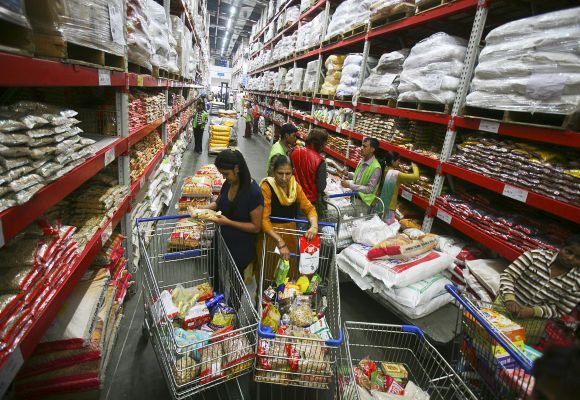
Data compiled by Business Standard's Research Bureau on the imports of companies in the fast-moving consumer goods (FMCG) sector suggest the government should re-examine the constraints on its ‘Make in India’ ambitions.
After oil, imports by leading multinational FMCG companies and electronic goods are the second-largest item on India’s import bill.
Some of these imports are intermediates and raw materials such as palmolein for soap, which can be cheaply sourced from countries like Indonesia; but the fact that imports have overtaken exports for many FMCG companies suggests that there are serious structural issues to be sorted out before India’s manufacturing lion can roar.
Right now, most domestic manufacturing units of FMCG multinationals entirely serve the Indian market (with some negligible exports to neighbouring countries).
But the rising FMCG import Bill increasingly includes finished products that are either being test-marketed in India or do not have a large enough market here to be manufactured domestically.
It is entirely plausible that the domestic market for certain kinds of premium FMCGs – shower gels, premium soaps and deodorants and so on – may not deliver the kind of critical mass to warrant manufacture here.
But the question needs to be tweaked to ask why India is not a manufacturing base for FMCGs, premium or otherwise, for the markets of Asia-Pacific, West Asia and particularly the fast-growing markets of the African continent.
The answer from these companies is all too familiar and echoes the problems that confront almost any manufacturer-exporter, whether of FMCGs, textiles or even engineering goods: India’s low cost-competitiveness and productivity and myriad troublesome local and federal laws and rules.
Manufacturing and exporting are just not worth the trouble when global trade rules make importing so much easier and cost-effective.
Proof that these issues are surmountable can be had from companies like Nissan, Maruti and Hyundai, which have made their Indian operations a low-cost base for exports of compact cars — but they remain exceptions in an otherwise tough operating environment. Resolving these may be medium-term issues.
But, in the immediate future, there is at least one anomaly the government can easily solve. It should examine the case for reimposing restrictions on royalty payments to foreign parents.
An earlier study by the Research Bureau showed that, ever since the rules for such payments were liberalised in 2009 in response to the global economic downturn, royalty payments became the largest source of earnings from India for the global parents of FMCG majors.
Government data show that royalty payments rose from 13 per cent of foreign direct investment flows in 2009-10 to 18 per cent in 2012-13.
This makes little sense in itself — and more so when added to the forex outflows on account of imports (which often amount to income to another subsidiary of the foreign parent) and dividend income that is repatriated to overseas headquarters.
‘Make in India’ may require the government to make concessions to attract foreign investment — but these concessions appear to have made no appreciable mark on India’s manufacturing story.








